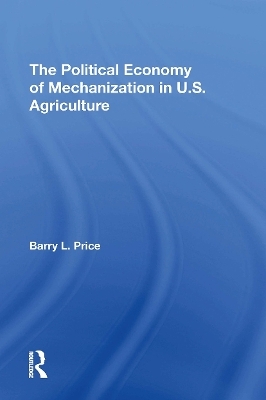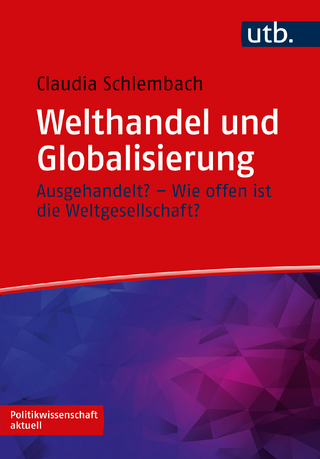
The Political Economy Of Mechanization In U.s. Agriculture
Seiten
2024
CRC Press (Verlag)
978-0-367-31038-7 (ISBN)
CRC Press (Verlag)
978-0-367-31038-7 (ISBN)
- Noch nicht erschienen
- Versandkostenfrei
- Auch auf Rechnung
- Artikel merken
This book aims to integrate in a single volume the best research efforts addressing the mechanization issue in U.S. agriculture, tracing the history of the mechanization issue and assessing the economic and sociological bases of the opposing positions.
For more than a decade the trend toward increased mechanization in U.S. agriculture has been the source of farm worker protests, legislative hearings, and lawsuits. (The recent case pitting the University of California’s prestigious agriculture research establishment against Cesar Chavez and the United Farm Workers is a prominent example of such litigation.) A key question in the controversy is whether federal and state governments should continue to invest more than $1 billion per year in the development of large-scale, capital-intensive technologies known to have significant social costs. Opponents of continued public support for these new technologies argue that they will eliminate thousands of farm jobs when the nation already suffers from a serious unemployment problem; proponents contend that such capital-intensive technologies keep food prices down for consumers while generating the potential for increased wages for farm workers. This book explores both sides of the debate, tracing the history of the mechanization issue and assessing the economic and sociological bases of the opposing positions. Maintaining that present methods of analysis are not adequate for resolving the conflict, Professor Price suggests an alternative approach, highlighted by a detailed case study of the costs and benefits generated by a new harvest technology adopted in the tomato-processing industry in California. He singles out the role of market structure as the most important variable in the distribution of benefits resulting from mechanization. Finally he relates his research findings to policy alternatives concerning farm mechanization in general, as well as to other problems involving technological change.
For more than a decade the trend toward increased mechanization in U.S. agriculture has been the source of farm worker protests, legislative hearings, and lawsuits. (The recent case pitting the University of California’s prestigious agriculture research establishment against Cesar Chavez and the United Farm Workers is a prominent example of such litigation.) A key question in the controversy is whether federal and state governments should continue to invest more than $1 billion per year in the development of large-scale, capital-intensive technologies known to have significant social costs. Opponents of continued public support for these new technologies argue that they will eliminate thousands of farm jobs when the nation already suffers from a serious unemployment problem; proponents contend that such capital-intensive technologies keep food prices down for consumers while generating the potential for increased wages for farm workers. This book explores both sides of the debate, tracing the history of the mechanization issue and assessing the economic and sociological bases of the opposing positions. Maintaining that present methods of analysis are not adequate for resolving the conflict, Professor Price suggests an alternative approach, highlighted by a detailed case study of the costs and benefits generated by a new harvest technology adopted in the tomato-processing industry in California. He singles out the role of market structure as the most important variable in the distribution of benefits resulting from mechanization. Finally he relates his research findings to policy alternatives concerning farm mechanization in general, as well as to other problems involving technological change.
Barry L. Price is assistant professor of government at Angelo State University, San Angelo, Texas.
Westview Replica Editions -- Preface -- The Political Character of Mechanized Agriculture -- The Mechanization of Agriculture: An Overview of Its Costs and Benefits -- The Method Behind the Madness of Current Mechanization Policy -- The Electronic Tomato Sorter: A Case Study in the Costs and Benefits of Agricultural Mechanization -- Conclusion -- Appendix
| Erscheint lt. Verlag | 31.10.2024 |
|---|---|
| Verlagsort | London |
| Sprache | englisch |
| Maße | 152 x 229 mm |
| Gewicht | 230 g |
| Themenwelt | Wirtschaft ► Volkswirtschaftslehre ► Wirtschaftspolitik |
| Weitere Fachgebiete ► Land- / Forstwirtschaft / Fischerei | |
| ISBN-10 | 0-367-31038-4 / 0367310384 |
| ISBN-13 | 978-0-367-31038-7 / 9780367310387 |
| Zustand | Neuware |
| Haben Sie eine Frage zum Produkt? |
Mehr entdecken
aus dem Bereich
aus dem Bereich
ausgehandelt? – wie offen ist die Weltgesellschaft?
Buch | Softcover (2024)
UTB (Verlag)
CHF 30,80
Theorie und Anwendung
Buch | Hardcover (2024)
Vahlen, Franz (Verlag)
CHF 55,70
wie sich unsere Wirtschaftspolitik ändern muss, damit wir globale …
Buch | Hardcover (2024)
Wiley-VCH (Verlag)
CHF 55,95


